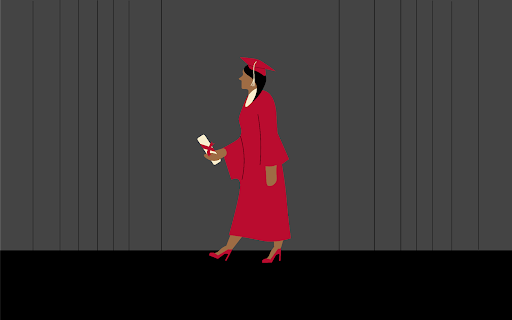Picture this: For weeks you work on an assignment, a project or a paper, and are confident with your work. You’ve read over it countless times and have made corrections each time. Finally, you submit it. A week later, your professor hands back your assignment, and the red “F” hits you like a splash of cold water. Panic starts to set in, your mind is racing with questions, and dread fills your chest as you worry about your GPA and your future.
Almost every college student has felt like this at one point or another. No one is immune from making mistakes — we are human after all! A failure in grade does not translate into you being a failure.
Reflecting on past experience, Adam Mokbel, a junior majoring in Finance, states “I typically take a bad grade personally; it makes me disappointed to think I performed poorly in something that I place so much emphasis and importance on, like my education. I think I place a great deal of my personal value on my grades, but I have learned to take a step back, put things into perspective, and understand that one grade doesn’t define me.” One bad grade does not define you as a student, and it certainly does not mean that you are unintelligent. The world of academics is a process – it takes time to get into your own personal groove, and even then, it can be difficult to keep that momentum going, especially after receiving a less than stellar score.
Students must first learn to move past the initial reaction of frustration after receiving a bad grade to transform the disappointment into motivation. Receiving a low grade should be a learning experience. After making a mistake, ask yourself some tough questions that will allow you to grow: What went wrong? Why did I get these questions wrong? How can I do better next time? What can I learn from this experience? One way to clear your head of post-test stress is to write down your answers to these questions. By writing down your responses, you can see what went wrong in the situation, and what you can do to turn it around.
Understanding what went wrong not only helps you work through the disappointment and stress of a bad grade, but it also helps you to not repeat the same mistakes again. Spend some time devising a unique plan for yourself to avoid making similar mistakes, as well as finding your personal motivation. Sometimes motivation doesn’t come naturally, resulting in slow periods in which a motivator seems hard to come by. During these times, it can be difficult to be present in class, complete assignments or prepare for exams. If you are in a slow period, you should research and understand different types of motivation and apply the skills that work best for you.
Positive and negative motivations can be effective in various situations; try and observe the effects that a motivator has on you. For students, it can be easier to pursue an academic goal that you are interested in, rather than avoiding a negative outcome. “Getting a bad grade lights a flame under me to do better and put more effort into studying for future assignments,” Mariana Bulko, a junior majoring in Speech Language Pathology and Audiology, told The Torch. “If necessary, I would reach out to my professor and ask how I could better prepare or even do extra credit work to improve my overall grade.”
However, if once you’ve found motivation and the material still isn’t seeming to stick, find a tutor. They can help you target the areas you need the most help in and breakdown complex topics that weren’t quite explained enough in the classroom. St. John’s provides various student resources, including the Writing Center, Library Resources and Tutoring Support.
It is important for students to realize that putting too much pressure on themselves can result in a poor outcome; the best thing for a student to do is transform academic low points into opportunities for growth.


















